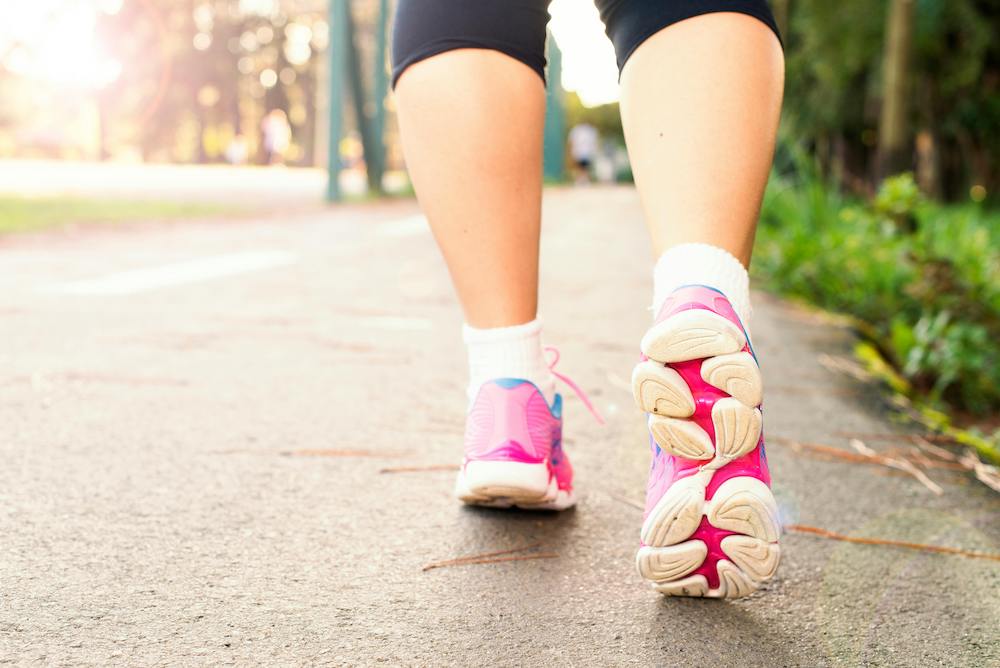Putting one step in front of the other. It’s “the closest thing we have to a wonder drug,” according to Dr. Thomas Frieden, director of the Center for Disease Control and Prevention.
Walking requires no equipment, no monthly fee, and no special skills. Taking walks, even for just 11 minutes a day, will significantly lower your risk of heart disease, many kinds of cancer, and mortality overall.
But can walking, alone, give you the weight loss results you want? Let’s hit the pavement and see what walking can and can’t do for your figure.
What Would Happen If You Tried to Lose Weight By Only Walking…
You can walk toward weight loss, but can you walk the weight off, without the help of other healthy habits? Here’s what would happen if you depended on walking, alone, for weight loss:
- You would burn calories
Walking burns around 100 calories per mile, depending on factors like speed and terrain. This can contribute to creating a calorie deficit and help your body shed pounds. - But your body would burn away both fat and muscle
When you’re in a caloric deficit, your body not only burns fat but also muscle for energy. This is especially true if you’re not engaging in strength training to preserve lean muscle mass. A study published in The American Journal of Clinical Nutrition found that without strength training, participants who lost weight through diet and cardio exercises, like walking, also lost muscle, not just fat. - Then, your metabolism would slow down
Losing muscle mass can negatively impact your metabolism. Muscle tissue burns more calories at rest than fat. When you lose muscle, your body’s overall calorie-burning capacity decreases. A slower metabolism can make it harder to continue losing weight and easier to gain it back. According to a study in the Journal of Applied Physiology, people who lose muscle through dieting experience a significant drop in resting metabolic rate, making future weight loss harder. - If you gain the weight back, you’ll gain fat, not more muscle
Cardio and calorie cutting contributes to muscle loss. If you regain weight after losing it from walking and dieting, you’re likely to gain fat rather than muscle, leading to a higher percentage of body fat. Research from the Obesity Research & Clinical Practice journal confirms that weight loss without muscle preservation can result in a “fat rebound,” where the body gains back more fat than muscle.
So, Is Walking Bad For You?
Not at all! Walking is nearly a wonder drug.
From extending your lifespan and warding off chronic diseases to boosting your energy and genetically changing your body into a weight loss machine, walking is an amazing exercise you should incorporate into your weekly schedule.
Let’s take a closer look at how a daily walk can increase weight loss and transform your mental and physical health.
5 Walking Benefits That’ll Make You Buy New Sneakers Today
Walking alone might not be the best health decision, but when you pair it with other important habits (see the four tips below), a short, daily walk:
- Boosts Mental Health and Reduces Stress
Walking is a powerful way to improve your mental health. Regular walks can reduce anxiety, depression, and stress by stimulating endorphin production, which enhances mood and provides mental clarity. - Enhances Physical Health and Fitness
As a low-impact exercise, walking improves cardiovascular health, supports a healthy weight, and lowers the risk of heart disease and diabetes. When walking becomes a habit, you can expect a stronger heart, improved circulation, and healthier joints. - Improves Cognitive Function and Creativity
Walking boosts brain function, enhancing memory, focus, and problem-solving. It increases blood flow to the brain, which can improve creativity and mental clarity, particularly if you can take your walk outside. - Counters the Effects of Weight-Promoting Genes
Harvard researchers found that walking briskly for an hour a day can reduce the effects of obesity-promoting genes by 50%. That means that your daily walk can help you maintain a healthy weight, even if genetic factors are working against you! - Helps Tame a Sweet Tooth
A 15-minute walk can curb chocolate cravings and reduce sugar intake. Studies from the University of Exeter found this hack, noting that walks are especially good at curbing cravings during stressful situations. - Reduces the Risk of Breast Cancer
Women who walked at least seven hours a week had a 14% lower risk of breast cancer compared to those who walked three hours or less, even those with risk factors like being overweight. - Eases Joint Pain and Prevents Arthritis
Walking helps relieve arthritis-related pain and can even prevent arthritis by strengthening muscles and lubricating joints. Walking five to six miles a week can reduce the risk of joint issues, particularly in the knees and hips. - Boosts Immune Function
Walking boosts immunity, reducing sick days by 43%! A study found those who walked at least 20 minutes a day, five days a week, had fewer and shorter illnesses during cold and flu season.
How to Leverage Walking for Weight Loss
Walking is one of several healthy habits within a healthy lifestyle. We can’t expect walking, alone, to give us the results we want. That’s like saying you should only eat apples and hope your body receives all the nutrients it needs from apples alone.
Walking, like an apple, is great for our bodies. It’s one of the things our bodies need to lose excess weight, thrive, and survive for many years. But it’s not the
You can glean all the benefits of walking by understanding its role and combining it with other healthy habits.
If you want walking to work for you, and not against you, take these steps:
- Step It Up: To experience all the amazing benefits of walking, shoot for at least 20 minutes of walking a day or 10K total daily steps. If this amount of walking is a big jump from your current activity, skip a potential injury and start at your own pace. Researchers have found that walking for 30 minutes (even if that time is split up into three 10-minute walks) three days a week can bring a big health boost.
- Build Some Bulk: Many women are afraid that lifting heavy weights will make them bigger. In reality, increasing muscle mass is incredibly hard—that’s why people turn to steroids! Even with a high-intensity muscle-building plan from a personal trainer, it takes a month of daily work to gain one pound of lean muscle.Strength training won’t make you bigger, but it will do wonders for your body! Lifting weights will help you melt away excess fat and preserve toned, beautiful muscles underneath. It’s the best form of exercise for weight loss!
- Protect Yourself With Protein
When we cut calories and increase exercise, we’re putting our bodies at risk of losing precious muscle mass. Eating plenty of protein every day protects our muscles from dwindling away.You need about 1 gram of protein per pound of your goal weight. Need help hitting those numbers? Check out these no-cook protein foods and my High Protein Cheat Sheet. - Cut Calories Conservatively:
Let’s put the 1200-calorie diet behind us. We now know that Restricting calories this low leads to metabolic changes in your body. These include increases in hormones like ghrelin and cortisol, which drive hunger, as well as a drop in metabolism (the calories that you burn while at rest).We each have different caloric needs. Find out how many calories you should be eating to lose weight.
Take a Step Toward Weight Loss
Walking brings many benefits to our bodies. It’s also one simple step toward your goal weight. Walking on its own, however, isn’t a direct path to take on your weight loss journey. Instead, join a comprehensive program that will guide you to weight loss.





